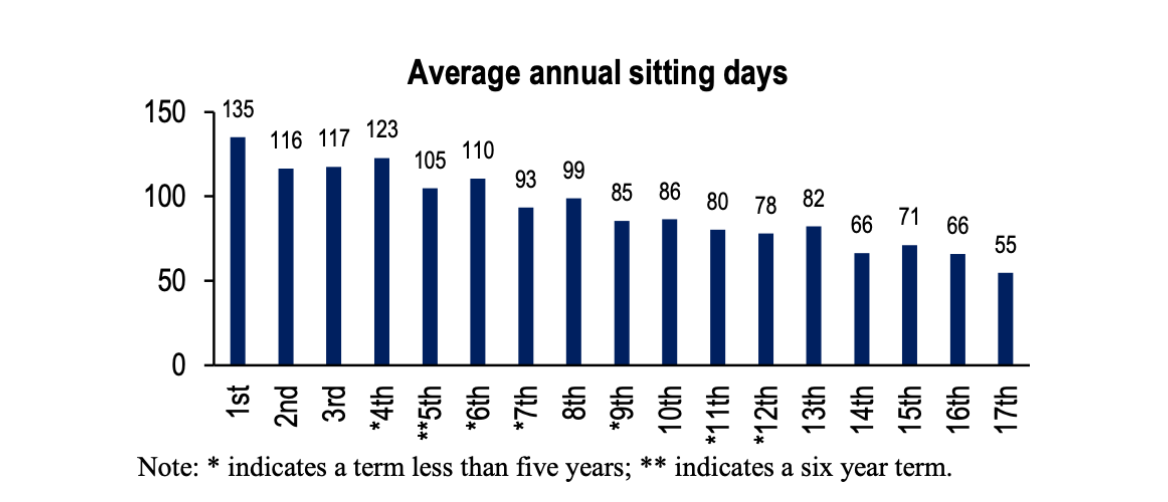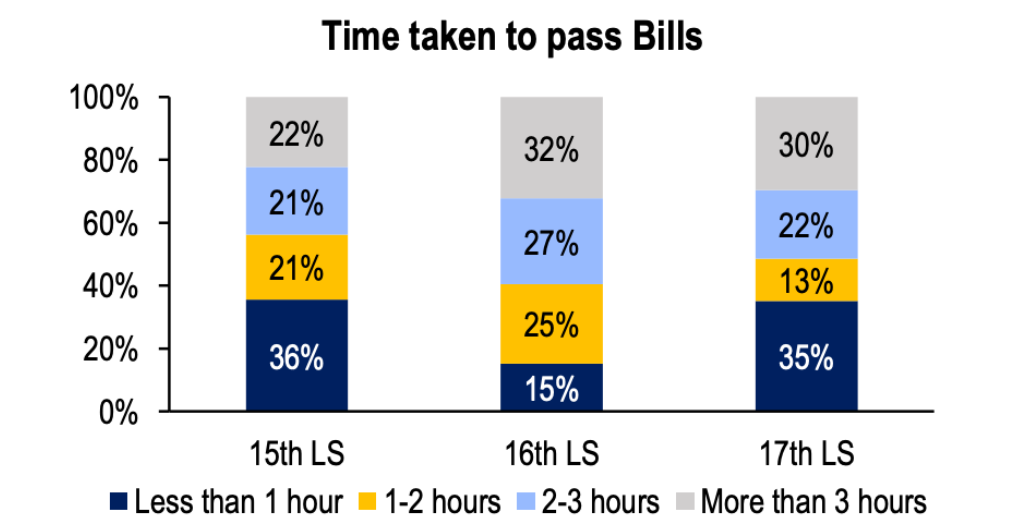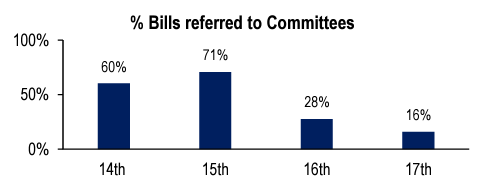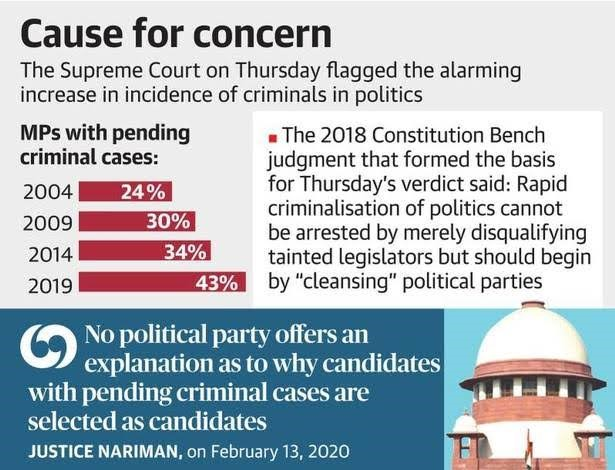Indian Polity
Functioning of 17th Lok Sabha: A Detailed Analysis
This editorial is based on “Parliamentary affairs: On the last session of the 17th Lok Sabha” which was published in The Hindu on 12/02/2024. The article delves into the performance of the parliamentary functioning of the 17th Lok Sabha in India, emphasizing both its accomplishments and areas of concern.
For Prelims: Lok Sabha, Women’s Reservation Bill, 2023, J&K Reorganisation Bill, 2019, Digital Data Protection Bill, Private Members’ Bills (PMBs), Biological Diversity (Amendment) Bill, 2021, Three Labour Codes, Three Farm laws, Three Bills replacing the IPC, 1860, the CrPC, 1973, and the Indian Evidence Act, 1872.
For Mains: Key Achievements of 17th Lok Sabha, Key Concerns in the Functioning of 17th Lok Sabha, Implications of Decline in Functioning of Lok Sabha.
The 17th Lok Sabha, which met from June 2019 to February 2024, conducted a noteworthy total of 274 sessions, lasting for 1,354 hours, and achieved a commendable work productivity rate of approximately 97%.
However, the operation of the 17th Lok Sabha has faced numerous criticisms, particularly regarding the government's tendency to rush bill passages, often amidst chaos and without adequate debate, thereby impacting the democratic functioning of the house.
What are the Key Achievements of the 17th Lok Sabha?
- Key Bills Passed: 179 Bills (excluding Finance and Appropriation Bills) were passed. The Ministries of Finance and Home Affairs piloted the highest number of Bills (15% each), followed by Law and Justice (9%), and Health and Family Welfare (9%) which includes:
- Private Member Bills: As many as 729 Private Members’ Bills were introduced in this Lok Sabha.
- Papers Laid by Ministers: During the 17th Lok Sabha, 26,750 papers were laid by Ministers.
- Parliamentary Standing Committees: They presented a total of 691 reports and more than 69% of Committee recommendations were accepted by the government.
- Use of Digital Technology: Maximum use of digital technology is being made in parliamentary work while realising the vision of a paperless office in the 17th Lok Sabha.
- Presently, more than 97% of question notices are being given through electronic mediums.
- New Parliamentary Building: On September 19, 2023, the Parliament moved into a new complex. It was a historic switch over from the iconic circular building to the lion capitol-topped triangular edifice on Central Vista as the home of India’s democracy.
- Starred and Unstarred Questions: During the 17th Lok Sabha, 4,663 starred questions were listed, out of which 1,116 questions were answered orally. In the same period, 55,889 unstarred questions were also asked which received written answers in the House.
What are the Key Concerns in the Functioning of 17th Lok Sabha?
- Fewest Sittings Amongst All Full-term Lok Sabhas: The 17th Lok Sabha held 274 sittings. Only four previous Lok Sabhas have had fewer sittings, all of which were dissolved before completing the five-year term. 11 out of the 15 sessions held during this Lok Sabha were adjourned early.
- Deputy Speaker Not Elected for the First Time: Article 93 of the Constitution requires that Lok Sabha elect a Speaker and a Deputy Speaker ‘as soon as may be’. This is the first time Lok Sabha did not elect the Deputy Speaker for its entire duration.
- Bills Passed within 2 weeks of Introduction: Most Bills introduced during the term of the 17th LS ( 58% of the Bills) were passed within two weeks of their introduction.
- The J&K Reorganisation Bill, 2019, and the Women’s Reservation Bill, 2023 were passed within two days of introduction.
- 35% of Bills were passed with less than an hour of discussion in Lok Sabha.
- Less than 20% of Bills were Referred to Committees: 16% of Bills were referred to Committees for detailed scrutiny. This is lower than the corresponding figures for the previous three Lok Sabhas.
- Few Private Members’ Bills and Resolutions Discussed: 729 Private Members’ Bills (PMBs) were introduced in the 17th Lok Sabha, which is higher than all previous Lok Sabhas, except the 16th. However, only two PMBs were discussed.
- Lesser Time Spent On Budget Discussions: Over the years, the time spent on budget discussions in Lok Sabha has reduced.
- Between 2019 and 2023, on average, about 80% of the budget has been voted on without discussion. In 2023, the entire budget was passed without discussion.
- Major Security Breach: On 13th December, 2023, in a major security breach coinciding with the anniversary of the Parliament attack, two persons jumped into the Lok Sabha chamber from the public gallery during Zero Hour, released yellow smoke from canisters and shouted slogans.
- Increased Criminalization: The increasing trend of criminalization in Indian politics refers to the growing presence and influence of individuals with criminal backgrounds in the political arena.
- The Association for Democratic Reforms (ADR) reported that 43% of the elected Members of Parliament in the 17th Lok Sabha had pending criminal cases against them.
What are the Implications of Decline in Functioning of Lok Sabha?
- Undermine Institutional Credibility:
- The inability of the Lok Sabha to effectively discharge its legislative responsibilities may undermine the credibility and authority of parliamentary institutions.
- This can weaken the democratic fabric of the country and diminish the legitimacy of elected representatives.
- Decreased Accountability:
- With fewer parliamentary sessions and reduced participation from legislators, there's less scrutiny of government actions.
- This can lead to diminished accountability as there are fewer opportunities for lawmakers to question policies, decisions, and expenditures.
- Weakened Representation:
- Parliamentary engagement is crucial for representing the diverse interests of the population.
- When engagement decreases, certain voices may be marginalized, leading to less inclusive policymaking and legislation that may not adequately address the needs of all constituents.
- Impaired Policy Quality:
- Meaningful parliamentary engagement typically involves robust debate, deliberation, and collaboration among lawmakers.
- When engagement levels decrease, the quality of policymaking may suffer as a result of insufficient input, scrutiny, and analysis.
- Stifled Innovation:
- Parliamentary engagement often serves as a platform for discussing and advancing innovative solutions to complex challenges.
- A decline in engagement could stifle the exchange of ideas and innovative policymaking approaches, hindering progress and adaptation to changing circumstances.
- Perpetuating Corruption:
- The nexus between crime and politics perpetuates corruption, as politicians with criminal backgrounds may engage in bribery, extortion, and other illicit activities to maintain their power and influence.
- This undermines efforts to combat corruption and promote transparency and integrity in governance.
What Should be the Way Forward?
- Build a Better Image of Parliament:
- Implement measures to enhance transparency in parliamentary proceedings, such as live broadcasting of sessions, increased access to parliamentary documents and records, and public disclosure of MPs' attendance and performance to build a better Image of Parliament.
- Improve the Quality of Members:
- Encourage political parties to adopt merit-based criteria for selecting candidates for parliamentary elections, emphasizing qualifications, experience, and commitment to public service.
- Promote diversity and inclusivity by ensuring representation of marginalized communities and underrepresented groups.
- Setting up a Constitution Committee:
- A Constitution Committee can conduct periodic reviews of the Constitution to assess its relevance, adequacy, and effectiveness in addressing contemporary challenges and evolving societal needs.
- This ensures that the Constitution remains a living document capable of adapting to changing circumstances.
- Promote Cross-Party Collaboration:
- Foster a culture of cooperation and bipartisan or multi-party collaboration within parliamentary committees to prioritize national interests over partisan agendas.
- Encouraging constructive dialogue and consensus-building can enhance the effectiveness of scrutiny processes and strengthen parliamentary oversight.
- Strengthen Scrutiny Support:
- Provide parliamentary committees with access to independent research and analytical support to aid in their scrutiny efforts.
- This can include establishing dedicated research units within Parliament or collaborating with external research organisations to provide expertise on complex issues.
- Assess Potential Impacts:
- Use various analytical tools and methodologies to assess the potential impacts of the proposed legislation across different sectors and stakeholders.
- This may involve conducting cost-benefit analysis, risk assessments, and scenario planning to identify both positive and negative effects.
- Establish and Enforce Rules of Conduct:
- Implement clear and enforceable rules of conduct for parliamentary proceedings outlining the decorum expectations, time limits for speeches, procedures for raising objections, and consequences for disruptive behavior.
Conclusion
India must embark on a comprehensive approach to political and economic reform, including parliamentary, political party, electoral, and judicial reforms, through careful deliberation and consensus-building. This collective effort is crucial for enhancing our democratic functioning in the country.
|
Drishti Mains Question: Q. Critically evaluate the standards of parliamentary functioning in India. Suggest measures to enhance accountability and productivity within the Indian Parliament. |
UPSC Civil Services Examination, Previous Year Questions (PYQs)
Prelims
Q. Which of the following is/are the exclusive power(s) of Lok Sabha? (2022)
- To ratify the declaration of Emergency.
- To pass a motion of no-confidence against the Council of Ministers.
- To impeach the President of India.
Select the correct answer using the code given below:
(a) 1 and 2
(b) 2 only
(c) 1 and 3
(d) 3 only
Ans: B
Mains
Q. To what extent, in your view, the Parliament is able to ensure accountability of the executive in India? (2021)








